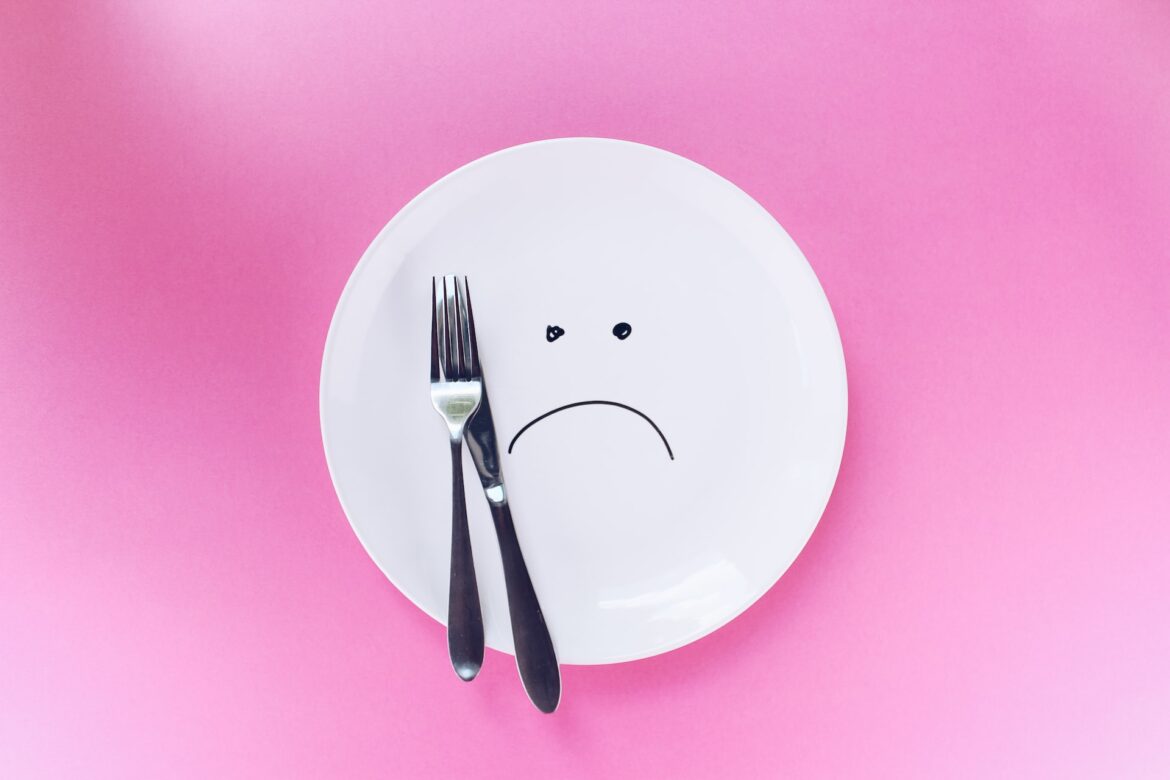Around 1.25 million people in the UK are said to experience problems with disordered eating to the degree that they may have a diagnosis. The increase in men with eating disorders is now becoming recognised – with 1 in 4 people who have disordered eating identify as male. A record number of young people are seeking help for disordered eating and some general signs to look out for include behaviours such as making rules about what or how they eat, eating a restricted range of foods or having a negative self-image or appearance. Often problems with food start off as a coping strategy or a way of feeling in control but can lead to more restrictive patterns of eating and behaviours.
Eating disorders are a serious mental health illness which at its most severe can be life threatening. It means that an individual has challenges with their eating habits, thoughts and emotions. Someone may eat too much or the reverse and eat too little, make themselves sick or use laxatives to purge themselves. Let’s look at the different categories of eating difficulties.
Anorexia Nervosa: This disorder is where someone will regularly restrict their food intake, leading to them becoming significantly underweight. The mindset being a total fear of gaining any weight and becoming “fat”, the view they have of themselves when looking in the mirror will be very distorted. With this disorder the person may also binge eat or purge.
Other features will include regular excessive exercise, calorie counting and, in some cases, only eating certain foods in an organised way. Other themes can include loose clothing to hide weight loss and their body.
Some of the consequences include damage to major organs, heart, kidneys including muscle tissue, poor circulation and concentration, loss of hair, fertility issues, feeling cold a lot of the time.
This disorder has the highest rate of fatalities over other mental health conditions. However, the symptoms can be treated, and the risk to the individual can be greatly reduces with the right intervention/treatment.
Binge Eating Disorder: This involves a person regularly binge eating, often large amounts of foods in a short space of time. A person with this disorder may eat until they feel extremely uncomfortable, and in some cases go to extreme lengths to obtain, for example stealing or hiding food.
This can be distressing for the individual and could lead to feelings of shame, the difference between this disorder and Bulimia is that there isn’t any purging after a binge.
Binge eating often takes place in private to avoid those feelings of shame, some of the triggers for this disorder are sadness, loneliness, and anger. Some people often report feeling disgusted with themselves after a binge episode which only reenforces the negative cycle of emotions, therefore repeating the cycle of binging.
Some of the physical consequences to binge eating are damage to certain organs, diabetes, high blood pressure and weight gain which can lead to obesity.
Again, like anorexia these symptoms can be reduced and people can go on to lead a more healthier lifestyle with the right treatment programme and ongoing support.
Bulimia Nervosa: This disorder involves binging and purging, eating large quantities of food all in one go. Even eating foods that someone would normally avoid.
With Bulimia Nervosa an individual would make themselves sick, use laxatives, fasting and excessive exercising to avoid weight gain. Like other disorders feelings of shame and guilt feature with this illness and can leave a person in a distressed state.
A lot of people suffering with Bulimia are not generally underweight which makes their illness harder to detect. BUT that doesn’t mean that the individual isn’t obsessed with weight, shape or even eating in front of others.
Physical consequences of this disorder are irregular blood sugar levels, causing blackout episodes.
Damage to the stomach, oesophagus and colon due to laxative use and frequent vomiting. Deterioration to teeth (enamel erosion) from vomiting.
OFSED (Other Specified Feeding or Eating Disorder): This encompasses some of the other disorders, the signs and symptoms very similar to other disorders, for example, restriction of food intake or the reverse overeating.
The feelings associated are the same, guilt, shame, distress, poor concentration. All of these perpetuate an individual’s cycle around their disorder.
There is no specific treatment for this particular disorder, so should be treated in the same way it is identified with others.
ARFID (Restrictive Food Intake Disorder): This title also encompasses a variety of different eating disorders, which involves restricting the amount of food a person eats or eating only certain foods. It can also involve avoiding food intake.
The common motivation drivers for this are:
- Sensory issues, for example taste, texture, smell, appearance of the food.
- Concern around eating the food for fear of choking or vomiting.
- Little interest in eating
Someone with ARFID will more often than not have one or more of the above drivers at any given point. This differs from other disorders as fear of weight gain would NOT be a motivation to avoid eating.
Some of the physical consequences are the same as other disorders, effects on major organs, weight loss. ARFID also has psychological symptoms such as anxiety, depression or low mood, loss of confidence.
Again with the right treatment intervention and support this can be resolved.
It’s fair to say that with all these disorders someone’s life can be significantly impaired due to the details outlined above. Manging the behaviours and often trying to hide them often involve the withdrawal from relationships, hobbies interests, social networks, education and the working environment. Living with someone who has disordered eating is extremely difficult and support for parents and others is available at the National Eating Disorders Association and BEAT.
We want to highlight that these disorders do not discriminate – men, children and young people can all suffer. Recent figures show a significant increase in young people having access to treatment programmes due to suffering with one of these disorders, it is crucial that the right support is available.
REMEMBER eating disorders are a serious mental health condition. It’s easy to think that it is all around eating habits when in fact it is all about how someone is thinking and feeling.
If you or anyone you know is struggling, please see links below for help and support.
Andrea Whittaker-Ward
Counsellor and Clinical Supervisor
Further information:
Take a look on our website https://thewellnessconsultancy.org for helpful guidance or contact us for support and advice – email: wellness-consultancy@outlook.com.
https://www.youngminds.org.uk/young-person/mental-health-conditions/anorexia/
https://mentalhealth-uk.org/help-and-information/conditions/eating-disorders/more-information/

